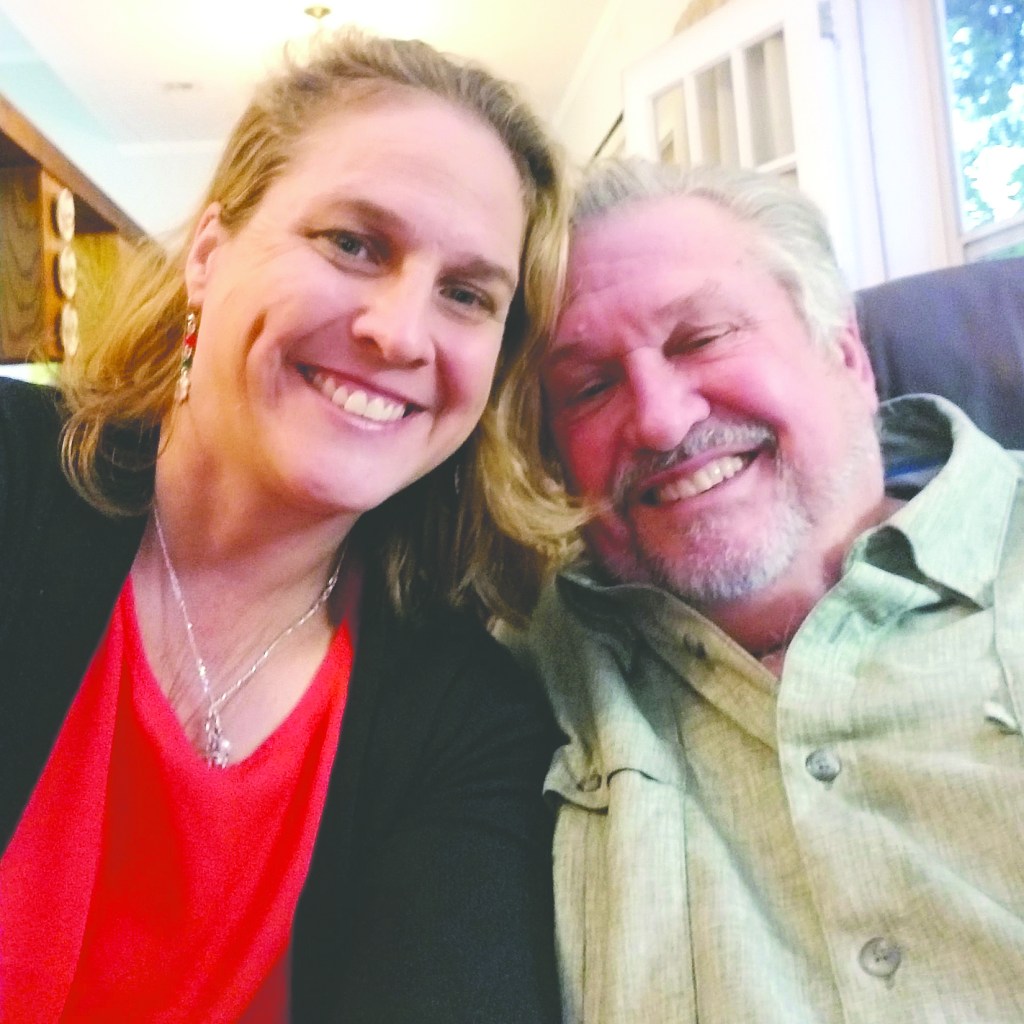Running for Meaning: 500 Miles for 500,000 COVID Deaths
Published 6:15 am Sunday, March 14, 2021

- Shelli Helms in happier times with her dad, Wayne Cestia.
Shelli Helms has writing on the palm of her left hand.
Not her grocery list, or a password to an online account, but a name, encircled with a heart. The name of someone who lives on in the hearts of the people he or she has left behind. You see, Shelli is on a mission. She has pledged to run 500 miles in honor of the 500,000 Americans who have perished because of COVID-19, a virus that a year ago, almost nobody knew about.
She has asked her friends to send her the names of those they’ve lost, mostly through her Facebook page. At first, she was amazed at the number of names that came pouring in.
“I hadn’t realized that locally, so many people had lost family and friends,” she says. The names have topped 100, getting close to 200. She writes the names on her hand to focus her thoughts and prayers during her run. ”I do about a mile per person, usually 2 or 3 at a time. I think about them, and the family that they’ve left behind. After I run, I let their person know I’ve run for their relative or friend.”
According to the CDC, COVID has claimed 529,301 U. S. citizens, including 9,861 Louisiana residents and 148 Iberia Parish residents. Shelli Helms knows these statistics all too well. Her family is one of those who has lost someone to this disease, and she’s searching for meaning through her grief.
“It’s been a horrible year,” she says.
Yes, it has been.
“I remember it started the weekend we were scheduled to have Scout Spring Camporee at Lake Fausse Pointe. I’d been watching the news as COVID spread across the planet, so I knew something was going to happen. A few days before the Camporee, everything started to shut down. I talked to my local leaders, who didn’t seem too concerned,” said Helms. “Then word came from Lake Fausse Pointe that they were closing the park. Then another message came, they had reconsidered, they were not shutting down, but there were new restrictions. We wound up going and camping, but the Scouts did not participate in any activities.”
Helms, her husband Travis and her five children hunkered down and learned the new normal. They adjusted, tried to carry on as best as they knew how. School became virtual, masks mandatory, social distancing, check; hand sanitizer, check. Things lumbered along as they will in times of plague. Until it got personal.
In late November, Shelli’s mother-in-law had to have emergency surgery. Helms relatives from Arkansas drove all night to be in New Iberia to support her. The outside family had a meal with the New Iberia Helmses, including Shelli’s parents, Goldie & Wayne Cestia. (“People drive all night in an emergency situation, you’re going to feed them,” said Shelli.) Before this, they’d been very careful, but no masks were worn at the dinner. The next day, one of the Arkansas relatives began to feel bad, but didn’t think too much of it. The day after the out-of-town guests got home, Shelli got the call. They’d tested for COVID. Positive.
A week later, most of Shelli’s family had the virus, and most got over it in due time, except her father, Wayne Cestia. A week after testing positive, he was admitted to the hospital. At 74, he was a robust individual, with one main concern: a lung injury lingering from a car crash in his 20s. A week later, he was on a ventilator in the ICU.
“The medical staff was just incredible the whole time my dad was sick — they’d set up an iPad so we could talk to him, sent us updates constantly, they really helped my mom during her vigil at his side,” she recalls.
The doctors monitored his numbers — he developed pneumonia and the virus affected his kidneys. He seemed to improve; doctors were talking about weaning him off the vent. He did improve enough to be sent to LTAC (Long Term Acute Care) in Lafayette. He seemed to do well at first, but it became clear that the virus had done too much damage and he would not recover.
“We were grateful that LTAC let us bring him home on the vent.” Cestia spent two days visiting his family and friends. He died Feb. 8.
During her dad’s illness, Shelli and her family struggled to stay strong, and get through the crisis. After it was over, there was a feeling of “Now what? What can we do to process these feelings?”
Shelli says her 500-mile run seemed to be a good way to not only honor those who died, but also get outside and think of others like her father always did.
“Dad always thought of others first, he never just thought of himself,” she said. “I am running for those that have died, but I’m also running for me. When I run, I can just be. If the grief hits me, I can just go with it, I can own my thoughts and emotions, while still acknowledging those I run for.”
Run, Shelli, you’re finding meaning for all of us.
“I do about a mile per person, usually 2 or 3 at a time. I think about them, and the family that they’ve left behind. After I run, I let their person know I’ve run for their relative or friend.”





